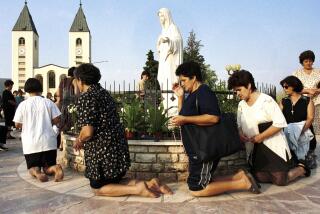Pope streamlines annulment process
- Share via
When Rae O’Hair sought an annulment of her first marriage from the Catholic Church more than a decade ago, it took her more than a year to complete the accompanying questionnaire.
The questions were personal and emotionally fraught. “I gave them a lot of thought,” said O’Hair, of Edgewood. “I felt I could only do a few at a time.”
She eventually did receive the annulment. But her second husband, who has since died, applied twice for an annulment of his previous marriage and was denied twice. So they married in an Episcopal church.
O’Hair still attends a Catholic church, but she applauded the news Tuesday that Pope Francis has streamlined the annulment process.
“Better late than never,” said O’Hair, who said she hopes Francis is able to continue to take steps to help “people who feel disenfranchised, that the church has let them down.”
With a couple strokes of the pen Tuesday, Francis eliminated all fees and reduced the layers of decision-makers and amount of evidence needed for annulments.
Annulments can take a year to 18 months now; under the new rules some cases would be heard within 30 days, and most within 45 days.
Currently, the process starts when a spouse petitions for an annulment and submits written testimony about the marriage and a list of people familiar with the marriage; those people must be willing to answer questions about the marriage.
A tribunal of clergymen contacts the other spouse, who can participate, but the proceeding can go forward without that person’s cooperation. Evidence is presented and witnesses testify, and then an advocate for the church, known as the defender of the bond, examines the evidence and argues that the marriage should not be dissolved. The tribunal issues a judgment that must be confirmed in another trial before an annulment can be granted.
Francis changed church laws to allow a single judge rather than three to oversee a case, and he eliminated the need for an automatic review by a second court.
In cases when evidence for an annulment is obvious to everyone involved, it can be granted more quickly without a laborious investigation, and some annulment decisions could be made directly by a local bishop. Spouses can still appeal to a regional authority and then the Vatican.
The unilateral changes in church law come just weeks before Pope Francis speaks to a major Catholic gathering on the family in Philadelphia (tickets for a speech by the pope near Independence Hall sold out in less than two minutes Tuesday), followed by a synod of bishops expected to discuss thorny issues including divorce, marriage and annulments.
It also comes even as many divorced Catholics in the United States aren’t bothering with the process. One-quarter of Catholic adults have been divorced, and only a quarter of that group said they or their ex-spouses sought an annulment, according to a recent Pew Research Center study that echoes earlier research.
Pittsburgh Bishop David Zubik said the decree has “opened the arms of mercy and hope to many Catholics who have suffered the pain of a failed marriage.” He compared it to the pope’s decree last week authorizing priests to absolve anyone who confesses to procuring an abortion, an absolution that technically requires an action from a bishop or his delegate.
The decrees on annulments and abortion are set to take effect Dec. 8, the start of what Francis has declared a Holy Year of Mercy and also the 50th anniversary of the conclusion of the reformist Second Vatican Council.
“It shows very clearly that the pope is a realist,” said George Worgul, a professor of theology at Duquesne University who has taught courses on marriage for nearly four decades. “He is very interested in making sure that the church is engaged as completely as it can be with people as they live their concrete lives. He understands that relationships can be beautiful but they also can be very challenging. Sometimes, the most important message the church has is one of forgiveness and being able to pick things up and carry forward.”
While the pope isn’t changing church teaching on marriage, Worgul said many younger adults will take notice of his shift toward a more welcoming tone.
“They don’t think religion is about rules and regulations” so much as about “relationship,” he said.
The fate of divorced and remarried people was hotly debated at a bishops’ synod on the family in October 2014 at the Vatican, with some calling for a less bureaucratized approach and others fearing a weakening of the church’s stance on marriage as permanent.
In the synod’s wake, the Diocese of Pittsburgh eliminated annulment fees this spring. That, said Bishop Zubik, led to an immediate increase in inquiries about annulments.
The diocese says it’s on track to accept about 200 cases for review in 2015, compared with about 170 last year.
Under Catholic teaching, marriage is a permanent sacrament that cannot be undone. However, a church tribunal can find that a marriage that ends in a civil divorce was never sacramentally valid in the first place if one or both parties entered into it without a full understanding of the obligations and nature of marriage. Evidence, according to the Diocese of Pittsburgh, could include “lack of openness to children, rejection of a commitment to fidelity and the permanence of marriage, severe immaturity, fraud or psychological problems such as depression or addiction.”
Pope Francis emphasized the nature of Jesus as a “clement and merciful judge” in his decrees, which affect Roman and Eastern Catholic canon law.
(c)2015 Pittsburgh Post-Gazette
Visit the Pittsburgh Post-Gazette at www.post-gazette.com
Distributed by Tribune Content Agency, LLC.
More to Read
Sign up for Essential California
The most important California stories and recommendations in your inbox every morning.
You may occasionally receive promotional content from the Los Angeles Times.













